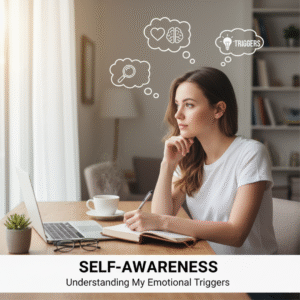Emotions are a natural and essential part of being human. They guide our decisions, influence our relationships, and shape the way we interact with the world around us. However, emotions can sometimes feel overwhelming or difficult to control, leading to stress, conflict, or impulsive behavior.
This is where emotional regulation skills come in. Developing the ability to understand, manage, and express emotions in a healthy way is vital for personal well-being and social success. In this article, we will explore what emotional regulation means, why it matters, and how you can strengthen your skills to navigate life with greater balance and resilience.
What Are Emotional Regulation Skills?
Emotional regulation refers to the ability to monitor, evaluate, and adjust emotional responses in different situations. It involves being aware of what you are feeling, understanding the triggers behind those emotions, and responding in ways that align with your goals and values. Emotional regulation skills do not mean suppressing or avoiding emotions altogether. Instead, they focus on experiencing emotions fully while managing them constructively so they do not take control of your actions or decision-making.
For example, feeling nervous before a presentation is normal, but emotional regulation allows you to calm your nerves, focus on preparation, and deliver confidently instead of letting anxiety paralyze you. Similarly, feeling angry during an argument is natural, but regulating that anger helps you communicate assertively rather than lashing out.
Why Emotional Regulation Is Important

Strong emotional regulation skills have a direct impact on mental, physical, and social health. When you are able to manage your emotions, you are more likely to think clearly, handle challenges calmly, and maintain positive connections with others. Some key benefits include:
-
Improved Relationships: By regulating emotions, you can express yourself without escalating conflicts and respond to others with empathy.
-
Reduced Stress: Managing emotions lowers the intensity of negative feelings and helps maintain calm during stressful events.
-
Better Decision-Making: Emotional regulation prevents impulsive reactions and allows you to make thoughtful, rational choices.
-
Greater Resilience: People with strong emotional regulation skills are better able to bounce back from setbacks and adapt to change.
-
Enhanced Self-Esteem: When you handle emotions effectively, you develop confidence in your ability to manage challenges.
These benefits highlight why emotional regulation is considered a fundamental life skill that can be practiced and strengthened over time.
Common Challenges in Regulating Emotions
Many people struggle with emotional regulation at some point in their lives. Common challenges include:
-
Emotional Reactivity: Some individuals experience emotions more intensely than others, which makes them harder to manage.
-
Avoidance of Emotions: Instead of confronting feelings, people may ignore or suppress them, leading to emotional build-up.
-
Impulsive Behaviors: Strong emotions can sometimes lead to rash decisions or actions that are later regretted.
-
Negative Thinking Patterns: Dwelling on past mistakes or imagining worst-case scenarios can make emotions more difficult to control.
-
Stressful Environments: High levels of stress from work, relationships, or life changes can make emotional regulation more challenging.
Recognizing these difficulties is the first step toward building stronger emotional regulation skills.
Core Emotional Regulation Skills

Developing emotional regulation involves practicing a range of strategies that help you notice, process, and respond to emotions effectively. Here are some of the most essential skills:
1. Self-Awareness
Self-awareness is the foundation of emotional regulation. It involves paying attention to your thoughts, feelings, and bodily sensations without judgment. When you recognize what you are feeling in the moment, you are better equipped to manage it. Techniques like journaling, mindfulness, or simply pausing to check in with yourself can help increase emotional awareness.
2. Mindful Breathing

Emotions often trigger physical responses like increased heart rate or shallow breathing. Practicing mindful breathing allows you to slow down these physical reactions, creating a sense of calm. Deep, steady breaths signal the body to relax, which in turn helps regulate emotional intensity.
3. Reframing Thoughts

The way you interpret a situation influences how you feel about it. Reframing involves challenging negative or unhelpful thoughts and replacing them with more balanced perspectives. For example, instead of thinking “I always mess up,” you might say, “I made a mistake, but I can learn from it.”
4. Emotional Acceptance
Fighting emotions often makes them stronger. Emotional acceptance means acknowledging feelings without labeling them as good or bad. This practice reduces resistance and allows emotions to pass naturally. Accepting that it is okay to feel sad, angry, or anxious makes it easier to process those emotions in a healthy way.
5. Problem-Solving Skills
Sometimes emotions arise because of specific challenges. In these cases, problem-solving is a powerful regulation tool. Breaking a problem down into smaller steps, brainstorming solutions, and taking action helps reduce feelings of helplessness or frustration.
6. Delayed Response
Taking a pause before reacting emotionally is a simple but effective regulation strategy. Counting to ten, walking away for a moment, or taking time to reflect can prevent impulsive actions driven by intense emotions.
7. Empathy and Perspective-Taking
Considering how others may feel in a situation can help regulate your own emotions. Empathy promotes understanding and reduces emotional intensity by shifting the focus from personal frustration to mutual connection.
8. Positive Coping Activities
Engaging in healthy coping activities such as physical movement, creative expression, or spending time in nature helps regulate emotions by providing a constructive outlet for energy. These activities release tension and promote balance.
Practical Strategies for Strengthening Emotional Regulation
Building emotional regulation skills takes time and practice. Here are some practical strategies you can integrate into your daily life:
Practice Mindfulness Daily
Mindfulness practices like meditation, body scanning, or mindful walking increase awareness of the present moment. They help reduce automatic emotional reactions and promote clarity of thought.
Identify Emotional Triggers
Keeping a journal of emotional experiences can help identify patterns and triggers. Once you know what situations or thoughts tend to spark certain emotions, you can prepare strategies to manage them in advance.
Develop a Routine
Consistent routines in sleep, nutrition, and daily habits provide stability that makes regulating emotions easier. A well-structured lifestyle reduces stress and supports emotional balance.
Build a Strong Support Network
Sharing your feelings with trusted friends, family, or mentors can provide validation and perspective. Social connections act as a buffer against overwhelming emotions and help you regulate more effectively.
Practice Self-Compassion
Being kind to yourself when dealing with difficult emotions is essential. Instead of criticizing yourself for feeling upset, treat yourself with the same understanding you would offer a close friend.
Use Visualization Techniques
Visualizing a calming scene or imagining a positive outcome can help regulate emotions during stressful situations. This mental imagery creates a sense of safety and optimism.
Focus on Small Wins
Setting realistic goals and celebrating small achievements builds confidence in your ability to manage emotions. Over time, these small successes create a strong foundation for emotional resilience.
Emotional Regulation in Different Life Areas
Emotional regulation plays a vital role in various aspects of life. Let’s look at some common contexts:
In Relationships
Effective regulation fosters healthier communication, reduces misunderstandings, and promotes mutual respect. It allows individuals to handle disagreements calmly and respond with empathy.
At Work
Professional environments often involve stress, deadlines, and collaboration. Strong regulation skills enhance teamwork, decision-making, and leadership, making them highly valued in the workplace.
For Children and Adolescents
Teaching emotional regulation early in life helps young people navigate challenges like peer pressure, academic stress, and family dynamics. Skills learned during childhood create a foundation for lifelong resilience.
In Times of Change
Major life transitions such as moving, changing careers, or adjusting to new circumstances often trigger strong emotions. Regulation skills provide stability during these times of uncertainty.
Building Long-Term Emotional Resilience
Developing emotional regulation is not a one-time effort but an ongoing journey. The more you practice these skills, the more natural they become in daily life. Resilience comes from consistently applying techniques, reflecting on experiences, and learning from both successes and setbacks. Over time, emotional regulation becomes a powerful tool that not only reduces stress but also enhances overall quality of life.
Conclusion
Emotional regulation skills are essential for maintaining balance, building strong relationships, and achieving personal growth. They allow you to experience emotions fully while responding thoughtfully rather than reactively. At Ciranox, we guide you in practicing self-awareness, mindfulness, reframing, and healthy coping strategies to strengthen your ability to manage emotions effectively. Whether at home, at work, or during personal challenges, developing these skills provides the foundation for resilience, well-being, and a more fulfilling life. All you need to do is fill up this form or sign up with Ciranox to start your journey toward better emotional health and holistic wellness with our expert support.




